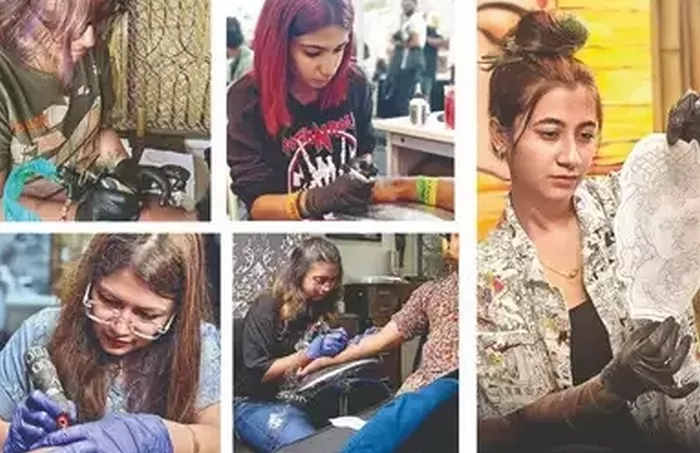As Women’s Day approaches, a group of talented tattoo artists is breaking stereotypes and proving that artistry has no gender. These women are challenging societal norms and establishing their place in a male-dominated industry.
Susweta Bhattacharya’s journey into tattooing began in Subhasgram, where she grew up in a family of idol makers. Art was always a part of her life, and after studying it in college, she discovered tattooing, a medium that intrigued and excited her. She started tattooing in 2021, and although finding clients who connected with her artistic style was initially difficult, her refined work soon attracted appreciation. For Susweta, the real change needed is a shift in how society views tattooing. She believes it is an art form that values skill and creativity over gender. To her, tattooing is about understanding a client’s vision and translating it into meaningful art, creating a collaborative experience based on trust. Her biggest milestone has been earning the respect and appreciation of her mentors.
Sukanya Roy began her journey in 2013, searching for a career that sparked her passion. She had always loved painting but never considered tattooing until she saw one up close. That experience shifted her perspective. Sukanya built her own studio from the ground up. While the tattoo industry itself is more welcoming of women, society still lags behind, with families often discouraging women from entering the field. Sukanya remains undeterred, refusing to let negativity distract her. For her, tattooing is about listening to clients’ stories and turning them into art. She creates a comfortable, ego-free space where every tattoo is not just beautiful but built to last. One of her most significant milestones came a month ago when a client told her that getting tattooed by Sukanya was a dream come true, making all her struggles worthwhile.
In 2014, Tuhi Dutta opened Kolkata’s first female-run tattoo studio. Her journey began with her desire to get a tattoo but feeling uneasy going to a male artist. This experience sparked her curiosity about why there were so few women in the industry. With no formal academy or mentors to turn to, Tuhi learned through YouTube and a part-time studio job. Her conservative family did not initially support her decision, but she persevered. For Tuhi, tattooing is about connection. She believes in designing tattoos that reflect the client’s vision without forcing her own style. Tattooing, she says, is a responsibility because it’s permanent art. One of her proudest achievements was opening her studio and proving that women can thrive in this industry.
Tridha Das became hooked on tattooing after getting her first tattoo in 2018. As an art student, she was fascinated by the precision of the craft. She honed her skills, received formal training, and never looked back. Being a woman in the industry has had its challenges, but Tridha found strength in her family’s support. She noticed that people still assumed female artists only created delicate designs, but she firmly believes that there is no such thing as a masculine or feminine tattoo—there’s only great work. For Tridha, tattooing is about trust. She values understanding her clients’ stories and translating them into meaningful tattoos. She also believes women bring a unique energy to the profession, offering more empathy, a safe space, and a deeper connection. Her greatest milestone is seeing the pride and satisfaction in clients’ faces when they see their finished tattoos.
Neha Kanjilal’s interest in tattooing started when she watched Kat Von D’s show on TV as a teenager. However, she didn’t know how to pursue it. After getting her first tattoo in college, Neha realized that becoming a tattoo artist was her true calling. She began tattooing in 2016, facing both support and opposition from her colleagues. Despite the struggles, Neha pressed on, using her experience as a woman to connect with female clients. The biggest challenge she faced was people assuming that, as a woman, she only designed tattoos rather than actually doing the tattooing herself. For Neha, the key to being a successful tattoo artist is respecting the craft and continually honing her skills. She connects with clients by listening to them first and building designs that reflect their stories. Her biggest milestone has been the repeat clients who trust her and return for more tattoos.
These women are not just creating art; they are shaping the future of the tattoo industry, one design at a time.
Related Topics

